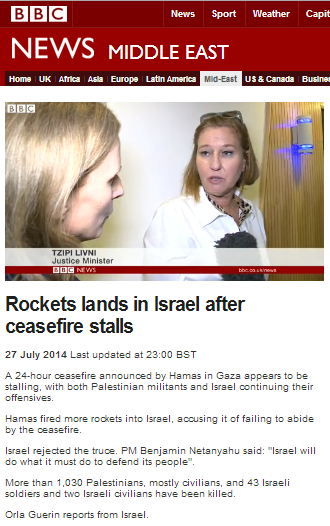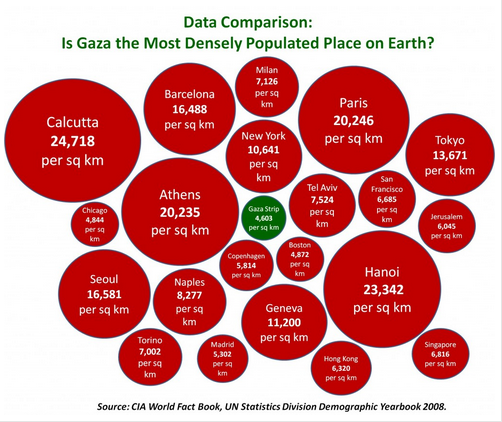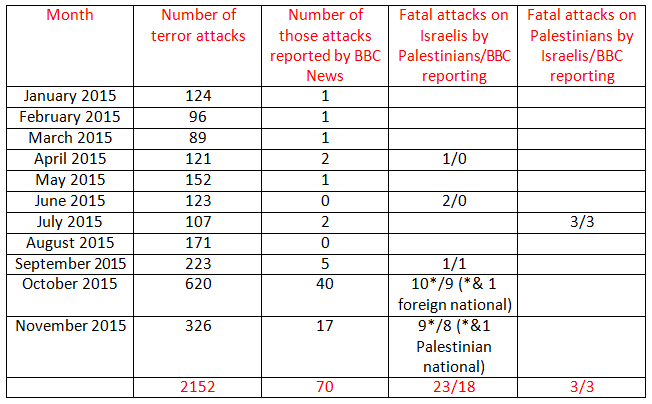On July 27th BBC television news programmes aired a report by Ian Pannell which also appeared on the BBC News website under the title “Hamas-declared ceasefire in Gaza stalls as conflict continues“.
Before we take a look at Pannell’s report, let’s remind ourselves of the timeline of events over the weekend.
On Saturday July 26th a 12-hour humanitarian ceasefire came into effect at 08:00 local time. Before that, nine missiles were fired from the Gaza Strip into Israel between midnight and 08:00. Throughout the agreed twelve-hour period, Hamas showed that it is capable of holding its own fire and preventing other terrorist organisations from acting when it wants to do so. At around 18:20 on Saturday evening, Israel said it would be willing to extend the ceasefire for a further four hours until midnight on Saturday night. Despite media reports that Hamas had also agreed to a four-hour extension, missiles were fired at Israeli communities at 20:04, and at least four subsequent barrages followed throughout the evening, including on Tel Aviv. At around 21:30 a Hamas spokesman said that Hamas would not extend the ceasefire until midnight after all. Just before midnight, the Israeli cabinet said it would further extend the ceasefire until 20:00 on Sunday, July 27th.
At 05:00 on July 27th mortars were fired from the Gaza Strip at communities in the Hof Ashkelon area. Further attacks took place at around 05:57, 08:10, 08:11, 08:33, 09:08 and 09:34 – with targeted areas including the Sharon and Shfela regions of central Israel. Just after 10:00 Israel announced that it was resuming fire in response to the missile attacks. Further missile attacks from the Gaza Strip took place at around 12:52 and 13:45. At around 13:30 Hamas announced a 24-hour truce starting at 14:00. Missiles were fired at approximately 14:19, 15:30, 16:18 (a woman was injured in that attack in a direct hit on her home while she slept), 16:42, 16:51, 17:22 and continued into the evening. From the morning of July 27th until 19:00, over 50 missiles were fired.
Ian Pannell’s report was filmed at around 10:00 on the morning of July 27th according to his account. In other words, at least seven missile attacks had been launched from the Gaza Strip by the time his camera began rolling. So let’s take a look at how he presented the situation to BBC audiences.
“Today was supposed to be quiet in Gaza. Israel extended its ceasefire, but Hamas did not. This was filmed by the Israeli military. They say it shows rockets being fired from a school across the border into Israel. “
Pannell then interviews Hamas spokesman Ehab Abu Ghossein.
IP: “What is the benefit to the Palestinian people of Hamas breaking the truce and then having massive Israeli airfire?”
EaG: “We’re looking for a total agreement and a full agreement that will end the killing and lift the siege totally and get our freedom.”
With a curious choice of words, Pannell goes on:
“This was Israel’s response. Well, it’s just gone ten o’clock in the morning…ahm…we were told that Israel was adhering to the ceasefire and that we were OK to travel on this area but we’re hearing a fairly constant barrage of artillery incoming. We’re seeing smoke rising in a number of different locations. There. There. Israel has declared its ceasefire over, but many residents were simply unaware.”
As noted above, Israel announced at around 10:00 that it would no longer hold fire due to the numerous missile attacks throughout the morning. Pannell, however, has nothing informative to say about those attacks meaning that BBC audiences remain ignorant of the circumstances behind Israel’s announcement that it would resume fire.
The rest of Pannell’s report is devoted to context-free accounts from local residents.
“The young mother said she was running away with her children because her house had been hit.”
“And while we talked to another resident, more shells were landing.”
The possibility that the Israeli fire might be directed at locations from which missiles were fired at Israel is not raised by Pannell, who also shows audiences footage of a context-free medical evacuation.
“An emergency team has been called out. People have been injured. Four people have been wounded. They said they’d been working on their farm. All of them had shrapnel wounds.”
As has been the case for the last three weeks, BBC camera crews apparently did not capture any of that abundant missile fire from the Gaza Strip on tape.
Pannell’s report was also featured in a written report titled “Hamas-declared ceasefire in Gaza stalls as conflict continues” which appeared on the BBC News website on the evening of July 27th. That article opens with the following interesting portrayal: [emphasis added]
“A 24-hour ceasefire announced by Hamas in Gaza appears to be stalling, with both Palestinian militants and Israel continuing their offensives.
Hamas fired more rockets into Israel, accusing it of failing to abide by the ceasefire.
Israel rejected the truce, PM Benjamin Netanyahu saying: “Israel will do what it must do to defend its people”.”
In other words, the BBC presents Hamas missile fire during a truce it had declared unilaterally as a response to Israeli fire during a truce to which it had not agreed.
The article’s fifth paragraph contains this interesting piece of information:
“The Gaza health ministry on Sunday revised the number of dead down by 30 after some relatives found missing family members.”
In other words, from that we seem to be able to conclude that the Hamas-run Gaza health ministry – which of course has been quoted numerous times a day by the BBC since the beginning of hostilities – does not overly trouble itself with definite identification of casualties before it announces the numbers – and civilian status – of dead.
That article does not provide readers with any independent BBC reporting of the missile fire on the morning of July 27th which caused Israel to resume activities, but presents it solely in the form of an Israeli claim.
“However, the Israeli military announced on Sunday morning it had decided to resume its air, ground and naval raids on Gaza in response to “incessant rocket fire” from Hamas, which has controlled Gaza since seizing power there in 2007.”
“Dozens of Hamas rockets were fired into Israel on Sunday, with some intercepted by Israel’s Iron Dome missile shield, according to the Israel Defense Forces (IDF).”
The article also includes a filmed report by Orla Guerin which was shown on BBC television news on July 27th and also appeared on the BBC News website’s Middle East page under the title “Rockets lands in Israel after ceasefire stalls“. The synopsis to that report as it appears on the website again promotes the misleading notion that Israel broke the Hamas-declared unilateral ceasefire to which Israel did not agree.
“Hamas fired more rockets into Israel, accusing it of failing to abide by the ceasefire.”
Guerin opens her report with footage from the direct hit on the house in the Sha’ar HaNegev district in which a woman was injured, saying in her perennially dramatic tone:
“Mid-afternoon in Israel. A message from Hamas. A rocket landed one hour into a ceasefire it had announced. The home-owner was moderately wounded.
And here; Israel’s response. The government insists it’s pounding Gaza to stop the rockets and to destroy a network of tunnels that can be used to launch attacks.”
Of course some of those tunnels have already been used to launch attacks, but Guerin does not inform her viewers of that.
“Well, Israeli troops remain in position here close to the Gaza border and they’re still in position on the other side. In recent days the defence minister has said the ground operation could be broadened significantly. Twenty days on, by Israeli standards, the army has already suffered heavy losses and we’re just hearing the sound now of outgoing fire.
The justice minister Tsipi Livni was at the bedside of one of the wounded troops. We’re not allowed to show his face. Israel has lost 43 soldiers but it has killed hundreds of Palestinian civilians.”
After that context-free statement based on figures provided by the Hamas health ministry but not independently verified by the BBC to date, Guerin goes on to ask Israel’s minister of justice one of her trademark ‘impartially’ vitriolic questions – clearly more intended at broadcasting her own inaccurate statement than actually getting any information which might be informative to viewers from her interviewee.
“How can Israel try to justify raining missiles down on one of the most densely populated areas on earth?”
Tsipi Livni responds:
“Well, we’ve tried to stop more than once. Just yesterday we took a decision – the Israeli government – to have a humanitarian ceasefire when Hamas said no, so….”
Guerin continues:
“She wouldn’t comment further but internationally, the questions keep coming about the huge number of innocent victims.”
Again – Guerin has no independently verified facts regarding the number of uninvolved civilians or the number of terrorist combatants. Likewise, she has no independently verified information regarding the number of casualties who were actually killed by misfired or short-falling missiles fired by terrorist organisations. She goes on:
“On a hill overlooking Gaza Israelis come to watch the warfare. For some – a spectator sport. For others – a painful vista.”
That flippant interpretation by Guerin shows that she – predictably – joins the ranks of those foreign journalists who prefer to advance their own knee-jerk theories rather than actually trying to understand what they are seeing.
Guerin closes by misleading viewers with the implication that Hamas’ terrorism against Israeli civilians has something to do with the fact that a Palestinian state has not yet been established.
“Ceasefires may come and go but there’s no Palestinian state on the horizon.”
Bear in mind that Guerin – reporting as she is from Israel – is supposed to be giving BBC audiences the Israeli side of this story. Clearly that is not what she was trying to do in this report.




